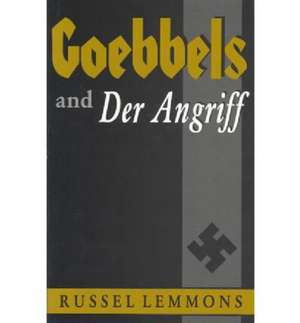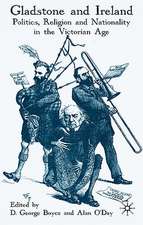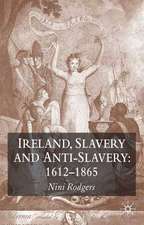Goebbels and Der Angriff
Autor Russel Lemmonsen Limba Engleză Hardback – 9 aug 2012
Preț: 158.87 lei
Nou
Puncte Express: 238
Preț estimativ în valută:
30.40€ • 31.91$ • 25.23£
30.40€ • 31.91$ • 25.23£
Carte tipărită la comandă
Livrare economică 10-24 aprilie
Preluare comenzi: 021 569.72.76
Specificații
ISBN-13: 9780813118482
ISBN-10: 0813118484
Pagini: 184
Dimensiuni: 146 x 225 x 19 mm
Greutate: 0.44 kg
Editura: University Press of Kentucky
ISBN-10: 0813118484
Pagini: 184
Dimensiuni: 146 x 225 x 19 mm
Greutate: 0.44 kg
Editura: University Press of Kentucky
Notă biografică
Textul de pe ultima copertă
The Berlin newspaper Der Angriff(The Attack), founded by Joseph Goebbels in 1927, was a significant instrument for arousing support for Nazi ideas. The paper not only secured National Socialism's continued existence, it also provided Goebbels, future propaganda chief of the Third Riech, a powerful new Weapon. Berlin was the center of the political life of the Weimar Republic. Goebbels became an actor upon this frenetic stage in 1926, upon becoming Gauleiter of Berlin's Nazis. He energized the movement, making the Nazi party a political force to be reckoned with, but a ban on the party in May 1927 left it in a state of disarray. His founding of Der Angriff enabled Goebbels to continue spreading his message of hate. Focusing on the period from 1927 to 1933, a time the Nazis later called "the blood years", Russel Lemmons examines how Der Angriff was used to promote support for Nazism. Violent anti-semitism permeated the pages of the newspaper, and the Jews became the scapegoat for all of Germany's, and the world's, problems. Some of the most important propaganda motifs of the Third Reich first appeared in the pages of Der Angriff. Horst Wessel, murdered by the German Communist Party in 1930, became the archetypal Nazi hero; much of his legend, a major chapter in Nazi mythology began on the pages of Der Angriff. Other Nazi propaganda themes - the "Unknown SA man" and the "myth of resurrection and return" - made their first appearances in this newspaper. How could the Germans, seemingly among the most cultured people in Europe, hand over their fate to the Nazis? As this book demonstrates, Der Angriff had much to do with the rise of National Socialism in Berlin and the cataclysmic results.














